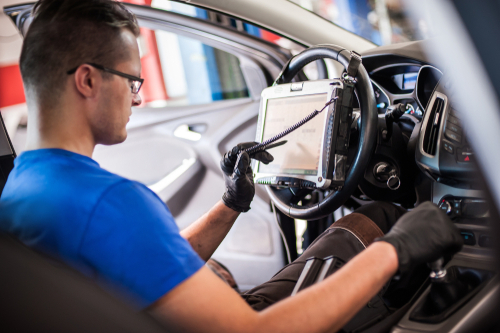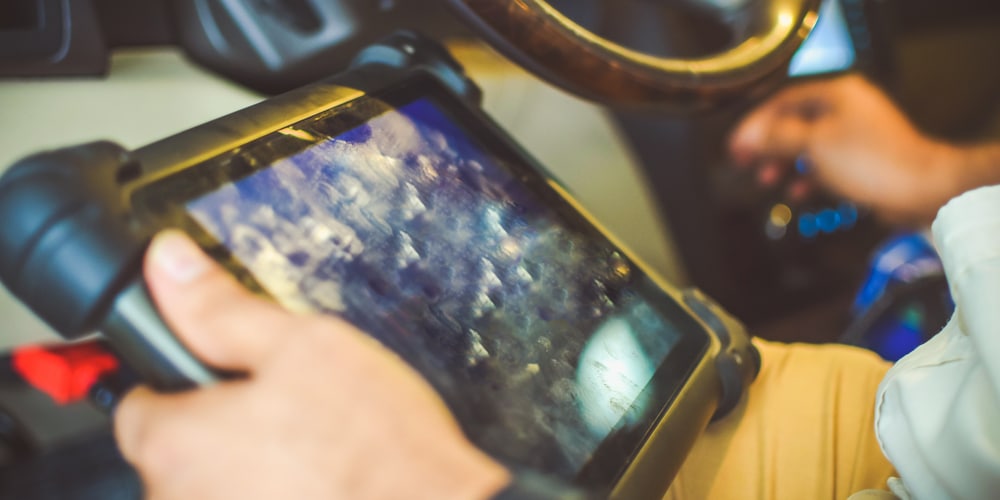A typical car inspection can take anywhere from 15 to 30 minutes for a basic safety check (assuming the shop is running on schedule). This includes examining the brakes, lights, horns, tires, and other critical safety components to ensure they meet the state’s required standards.

If the inspection also involves emissions testing, which is required in some states or regions to assess a vehicle’s environmental impact, the process could extend to about 30 to 45 minutes.
The duration of a car inspection can vary based on:
- The specific requirements of the state or region.
- The type of vehicle being inspected.
- The condition of the vehicle.
- The workload or efficiency of the inspection station.
If repairs or additional checks are needed based on the initial inspection findings, the overall process will take longer. It’s always a good idea to schedule your inspection ahead of time and inquire about the expected duration so you can plan accordingly.
Factors Affecting Inspection Time

The duration of a car inspection can vary due to a number of specific factors related to your vehicle and the inspection process itself.
Vehicle Age and Condition
- Newer Vehicles: Typically quicker to inspect as they often have fewer issues.
- Older Vehicles: May require more time for a thorough check, especially if maintenance has been deferred.
Inspection Type and Scope
- Basic Inspections: Generally quicker, focusing on essential safety components.
- Comprehensive Inspections: More time-consuming, evaluating the vehicle’s overall condition in detail.
Availability of Inspection Services
- High Demand Periods: Wait times may increase, delaying the start of the inspection.
- Inspection Station Staffing: Adequate staffing levels can reduce total time your car spends at the facility.
State Regulations and Requirements
- Varied Inspection Mandates: Depending on your state, the complexity of mandated tests can affect duration.
- Documentation Processing: Time may be added for paperwork verification and processing based on state protocols.
Steps Involved in a Car Inspection
When you bring your vehicle in for an inspection, a series of comprehensive checks is performed to ensure its safety and compliance with regulations.
Document Verification
Initially, your inspector will require that you present your vehicle’s documentation. You may need all or none of the following (depending on the State). You will need them to get plates, either way.
- Vehicle registration
- Proof of insurance
- Title of the car
Visual Exterior Inspection
Next, the inspector examines your vehicle’s exterior. This includes:
- Headlights, tail lights, and turn signals
- Windshield and wipers
- Tires (tread depth and condition)
- Mirrors and windows
Look for any damage or modifications that could result in a failed inspection.
Interior and Functional Checks
The interior inspection includes:
- Seat belts (function and condition)
- Horn functionality
- Dashboard warning lights
Test all these features beforehand to spare any surprises during the inspection.
Onboard Diagnostics (OBD) Scan
Your vehicle will be subjected to an OBD scan to assess its electronic systems. The scan detects:
- Engine faults
- Emission control systems issues
- Any saved error codes
Drive your car regularly prior to the inspection to ensure the OBD system is ready for testing. If the check engine light is on, it’s usually an automatic failure.
Emissions Testing
The final step is to measure your vehicle’s exhaust emissions. This test ensures your vehicle is not exceeding pollutant limits. Be mindful of your vehicle’s maintenance to pass this section without issues.
Preparing for a Car Inspection
Proper preparation can streamline your car inspection process. Ensure you have necessary documents, perform a pre-inspection checklist, and schedule your appointment in advance.
Gather Required Documents
Identification and Ownership Documents:
- Driver’s license
- Vehicle registration
- Title (if applicable)
Proof of Insurance:
- Insurance ID card or digital proof
Pre-Inspection Reports:
- If you’ve had a pre-inspection, bring any related reports or repair documents.
Perform Pre-Inspection Checks
Exterior and Interior Checks:
- Lights (headlights, tail lights, turn signals)
- Windshield cracks or chips
- Tire Condition
- Brake functionality
Under the Hood:
- Engine oil level
- Coolant level
- Brake fluid level
Emissions Components (if applicable):
- Take note of any check engine lights or codes. Addressing these before your appointment is critical.
Schedule an Appointment
Make an appointment with an authorized inspection station:
- Check availability online or call ahead
- Choose a date and time that suits your schedule
Reminder: Arriving on time or early can help avoid delays.
Expected Wait Times by State
When you’re preparing for a car inspection, the duration can vary significantly from one state to another. Below is a list of several states and their respective average wait times for vehicle inspections.
- New York: Your car inspection is expected to take approximately 30 minutes, provided there are no major issues found with your vehicle.
- Texas: You might expect the inspection to last about 15 to 30 minutes for most vehicles.
- California: As there’s no state-wide requirement for safety inspections, only an emissions test is conducted, which typically takes about 20 minutes.
- Pennsylvania: When you’re in Pennsylvania, plan for the inspection to take about 1 hour as it includes both emissions and safety inspections.
While these times serve as a general guide, actual wait times can be influenced by the inspection station’s workload, staffing levels, and the condition of your vehicle. Always allow for some buffer time when scheduling your appointment or visiting a station with no appointment necessary.
Frequently Asked Questions
When approaching a car inspection, you may have questions regarding the process duration and what to expect. This section aims to provide specific answers related to various car inspection scenarios across different states.
What is the typical duration for a vehicle inspection in Pennsylvania?
In Pennsylvania, a standard vehicle inspection typically lasts about 30 to 45 minutes. This assumes no major issues are found that need immediate attention.
What items are examined during a car inspection in North Carolina?
During a car inspection in North Carolina, your vehicle’s brakes, lights, horn, tires, wipers, turn signals, mirrors, and exhaust system are checked for functionality and safety.
Can you provide an estimate of how long a car inspection might take in Massachusetts?
A car inspection in Massachusetts can generally take 15 to 30 minutes. However, this time can vary depending on the vehicle’s condition and the service center.
What factors could affect the duration of a vehicle inspection in Florida?
The duration of a vehicle inspection in Florida can be affected by factors such as the type of inspection, the condition of your vehicle, and the inspection station’s workload at the time of your visit.
During a car inspection at service centers like Jiffy Lube, what is the expected wait time?
At service centers like Jiffy Lube, a car inspection is usually completed within 15 minutes to an hour, depending upon the location and the number of vehicles in the queue.
What are the common reasons for car inspection delays?
Common reasons for delays in car inspections include a high volume of customers. They also include the discovery of issues that require additional repairs. Sometimes, the need for a more detailed review based on the vehicle’s model or age can also cause delays.
